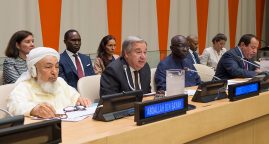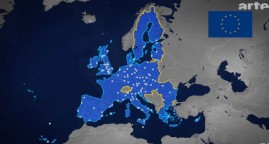New approach to internal displacement must aim for prevention, better solutions – UN deputy relief chief
With efforts to respond to the plight of more than 60 million internally displaced people (IDPs) around the world is falling short, a senior United Nations humanitarian official reiterated the UN relief wing’s call for a new approach to the crisis, in terms of coordination as well as better prevention and better solutions.
“For humanitarian and development partners, effectively addressing protracted displacement in long-term crises involves a shift in the way we are working together,” Kyung-wha Kang, the UN Deputy Emergency Relief Coordinator, said today an event at the UN Headquarters in New York.
“Through this new way of working we must aim not only to save lives in the short term, but to work with development and other partners over years, to work towards collective outcomes of reducing vulnerability and need, based on our comparative advantage,” she added.
In September 2016, UN Emergency Relief Coordinator Stephen O’Brien along with Chaloka Beyani, the Special Rapporteur on the rights of IDPs as well as other senior UN officials and partners had issued an open letter on the internally displaced in which they called for a new approach to the internally displaced, both in terms of better prevention and better solutions.
This new approach builds on the commitments made at the World Humanitarian Summit in Istanbul, last year, and the call for effective strategies to address internal displacement at the Summit for Refugees and Migrants held last month in New York on the side-lines of the high-level segment of the General Assembly’s 71st session.
Further in her remarks, the Deputy Emergency Relief Coordinator outlined that the new approach to displacement would mean that governments, development partners and investors must integrate IDPs into their development plans, so those displaced can access housing, livelihood opportunities and basic services.
“It means that we, as partners, must support and reinforce local systems rather than undermining them by setting up parallel structures. And it requires donors and investors to provide flexible, long-term financing to support it,” she stressed.
Recalling the ‘Grand Bargain,’ a key outcome of the World Humanitarian Summit that called for a more efficient, transparent, accountable and effective way of working, Ms. Kang, also the UN Assistant-Secretary-General for humanitarian affairs also spoke of efforts underway to strengthen social safety neds for IDPs, including through cash assistance can be used in contexts of protracted displacement, when permitted by prevailing markets and operational contexts.
She also informed of the continuing humanitarian need to respond to the immediate life-saving and protection needs of the displaced, while also supporting their resilience and self-sufficiency.
Ms. Kang was speaking at an event jointly organized by the Permanent Mission of Switzerland to the UN and the UN Office for the Coordination of Humanitarian Affairs (OCHA) to discuss effective strategies to address internal displacement.
Read the full article on UN website
Related Articles
Secretary-General’s remarks on the Launch of the Fez Plan of Action
07/14/2017. The Plan is based on a unifying commitment to promote peace, understanding, mutual respect and the fundamental rights of all people. This includes the rights to freedom of religion and belief, opinion and expression, and peaceful association.
EU, migrants, borders …
December 2013. Discover with the ARTE TV show the migratory phenomena in Europe
UNESCO Rewrites Jerusalem’s History
10/21/2016. The latest vote essentially denies Jewish and Christian ties to Jerusalem.






